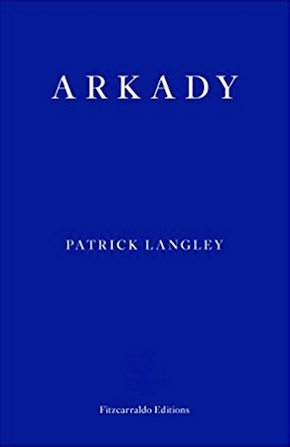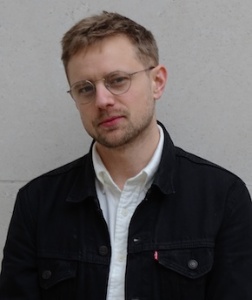A beginning
by Patrick Langley
“Thick with smoky atmosphere and beautifully controlled – this is a vivid and very fine debut.” Kevin Barry
Everyone loves an origin myth, even if most are exaggerations or convenient distortions, and some of them outright lies. But if you want to know where the idea for my debut novel Arkady came from, I might as well tell you this story.
Sometime around 2010, while I was working as a freelance radio producer, my boss tasked me with travelling across London to interview a guitar technician for a radio documentary about guitarists. The man’s legal name – according to the music magazine editor I’d spoken to briefly on the phone, who assured me he wasn’t joking – was Guitar Dave. Guitar Dave lived on a quiet street on a hill in Plumstead, a suburb on the outskirts of southeast London, and I travelled there by train. The journey was slow: it took over an hour.
I spent a few hours in Dave’s kitchen, talking about his various pedals and amps and guitars and mysterious boxes, while he played a few squawking, wobbly riffs and licks with tobacco-stained fingers. With his busted leather coat, which he wore indoors, and scraggly mop of grey hair, he bore an uncanny resemblance to Del Preston, the softly spoken roadie from Wayne’s World 2. One of the most memorable lines in film belongs to Preston, who recounts a night spent fetching brown M&Ms for Ozzy Osborne from a shopkeeper and his son: “I had to beat them to death with their own shoes.”
Guitar Dave, I am relieved to say, did not beat me to death with my own shoes. He was, in fact, outrageously polite, and when I left his house – in the siesta-like lull after lunch and before rush hour – London was bathed in sunshine. Plumstead station, when I arrived, was completely abandoned. The next train back to town was ten minutes away. Wind ruffled the tall, green trees that lined the platforms. Overhead, the sky was a clear, pale blue. The station felt at once eerie and bucolic, as though the world had ended in a silent cataclysm, everyone had died, and the city had become a vast, lush forest bathed in unpolluted air. I felt completely alone – a rare feeling in London, liberating and unsettling at once.
The fraught tenderness and toughened intimacy of their interactions suggested a deep fraternal bond, and in my voyeuristic, fictionalising mind, I began to sketch out their biography.”
Two boys walked down the steps and onto the platform. They stood in the sun a little distance away from me, in shorts and T-shirts that looked scuffed and grubbed by days of playing on dusty streets. One was clearly older than the other, stockier, more serious-looking. I guessed he was 13. He was pushing an old, rusty bike, and it bestowed on him an air of authority. The younger boy was blonder, paler, skinnier, but something about his willow-thin limbs suggested he would grow up to be the taller of the brothers. He was carrying a stick, which he used like a bat or a sword, swatting the air with whips and flickers, making complicated shadow-patterns on the platform.
Without any evidence, I had almost immediately decided that the boys were brothers. That decision was based on something hard to define, but unmistakable. The fraught tenderness and toughened intimacy of their interactions suggested a deep fraternal bond, and in my voyeuristic, fictionalising mind, I began to sketch out their biography. The way they had materialised out of the tall trees, beneath a bright sky, lent them the aura of an apparition: ghosts in the midst of the city’s stillness. But the longer I spent with them, the more solid and real they seemed – it felt as though they were realer than I was. I stood a little way off, squinting at the sun-baked concrete of the platform, or at the wavering green of the leaves, clutching the bag in which I kept my recording equipment. The brothers were fierce and oblivious, so absorbed in one another that they hadn’t noticed me. I was invisible to them.
A more troubling thought occurred to me. Perhaps these brothers were, in turn, invisible to the city. Perhaps that invisibility was like a reflection, a mutual erasure of awareness. How would they survive, under such circumstances – in a city that barely knew they existed, that didn’t care for or support them?
Eventually, the train arrived. As we trundled west through London suburbs, heading on a circuitous route back to Victoria, dusk set in. The sky’s light slowly died, and streetlamps began to burn across the back streets, scrubby parks, tangled alleys, and oil-stained yards that cluster like lichen around the city’s railway lines. What did this grand, brash, grubby, sleek, rich-and-poor and contradictory city have to offer those boys, those brothers? Watching them, it seemed clear that they had nothing but each other. A few grubby clothes, a bike that had seen better days, and a stick picked up off the floor: nothing else to protect them but the lint in their pockets, the anger in their eyes, and their knotty, difficult, self-sustaining and brotherly love.
I pictured the brothers playing there, alone, as hidden from view as it was possible to be in this city, leaping onto barges and surviving in unloved shadows.”
At one point, we crossed over Deptford Creek, a muddy inlet where dead boats lurked at low tide. I pictured the brothers playing there, alone, as hidden from view as it was possible to be in this city, leaping onto barges and surviving in unloved shadows. It was many years before I wrote a word of Arkady. Countless influences, ideas, and memories flowed into the novel in that intervening time. But perhaps that afternoon is where the story began, or where one of its countless beginnings lies: two boys, the blank stage of an empty train station, and the itching of empathy. I wanted to know what their life was like. And so, a few years later, I started to write it.
 Patrick Langley is an editor at Art Agenda and contributing editor at The White Review. His debut novel, Arkady, is published by Fitzcarraldo Editions.
Patrick Langley is an editor at Art Agenda and contributing editor at The White Review. His debut novel, Arkady, is published by Fitzcarraldo Editions.
Read more
patrick-langley.net
@PaddyLangley

